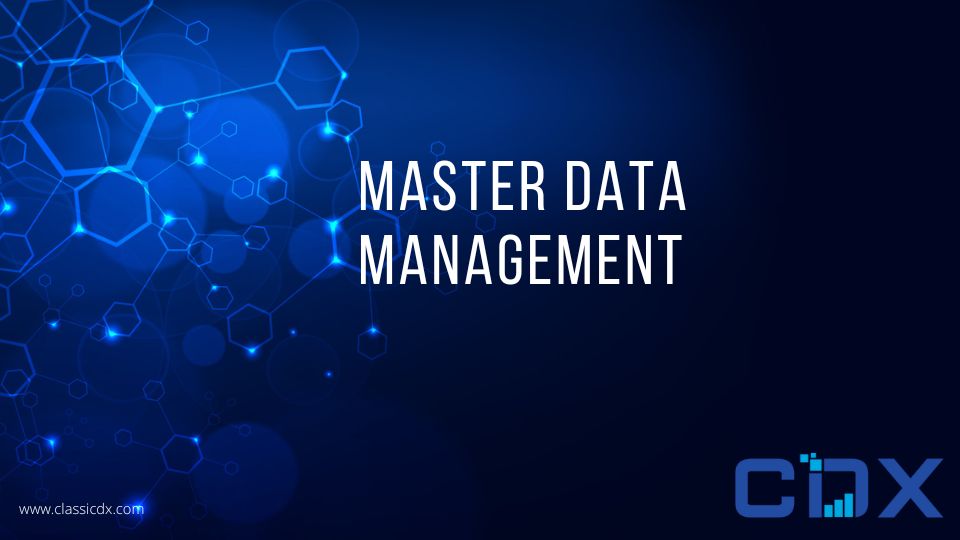Why Master Data Management is so important?

Introduction
Modern businesses have to deal with an enormous amount of data, with the typical enterprise sporting well over 100 databases and petabytes of stored information. This vast amount of data comes from all sorts of sources: point-of-sale terminals, financial transactions, customer details, product details, and more. In many businesses today data that cross organizational departments or divisions can quickly become duplicated, inaccurate, inconsistent, and most commonly out of date.
What is Master Data
Master data is the unique data about key business entities that provide context for business transactions and operations. A well-run organization will have a central repository for all of its master data, which can then be used to populate various operating systems. The master data is often referenced in a variety of business entries that are captured in day-to-day transactions. Data about business partners include customer, supplier information, product data that is referenced in purchasing and sales systems, and GL which are commonly used to post financial data.
Master Data Management (MDM)
Master data management is the process of structuring, centralizing, managing, and updating the master data catalog. This process is done according to the principle which enables data governance to align the data to the strategies of the organization. Master Data Management supports business initiatives and objectives through the identification, linking, and synchronization of information across master catalogs used in a variety of the software applications such as SAP, Salesforce, etc. The modern cloud-based data warehouse supports storage and scale as the data grows.
Why Master Data Management?
Most organizations use a large number of data sources. Many people interact with this data on a day-to-day basis and this data is then circulated and used in many applications. If the data is inaccurate, it may lead to bad decision-making. The following are some of the reasons why Master Data Management is important
Incomplete, and Inconsistent Master Data
There is a widespread problem of having multiple sources of information in large organizations. And usually, the associated information to these sources is also not consistent. As data changes over time, it can become incomplete, and inconsistent. Degradation of data leads to a loss of trust among those using it.
For e.g. An incomplete or inaccurate customer record can negatively impact a sales call – Is the customer’s address/location right or changed?
Is the item master unit of measurement updated as per the latest packing?
An incorrect answer to any of these questions could threaten a new sale or existing relationship. A company’s data would be protected by MDM by creating a trusted customer profile.
Customer Experience
Multi-channel data management involves creating, capturing, and accessing data across multiple systems, applications, and channels. This includes ERP, CRM, web portals, and more. An organization will be able to better understand its products and suppliers, increase customer engagement, and offer a consistent experience to employees and customers with a trusted source of reliable, current data. MDM helps prevent disjointed customer experiences in companies with segmented product lines, multiple interaction points and channels, and distributed geographies. With MDM, companies gain confidence that the data they rely on remains trusted and authoritative.
Fragmented data sources
Some organizations have yet to realize that their data has become highly decentralized, stored in myriad applications and tools that span multiple systems and locations that most often do not interact with each other. Thus, it is important to link all these sources and form a consolidated, centralized platform.
Redundancies
Information that comes from multiple, conflicting sources creates costly redundancies for organizations. The MDM system eliminates these redundancies by providing a single point of reference for vital business data. Organizations can better understand their target audience and their preferred communication channels by aggregating complete and trustworthy data from customers
Compliance
Compliance is another area that can be addressed through master data management. It can help organizations comply with regulators and privacy laws by simplifying the handling of customer information or other personal information. The General Data Protection Regulation (GDPR) would benefit from centralized management of customer master data,
Data Quality
Improve data quality and lower costs by effectively consolidating, cleansing, enhancing, and governing data using MDM. If records need editing, updating, or deleting, MDM changes the relevant golden record for the amendment to be reflected everywhere.
Data Governance
An enterprise data governance framework aligns data management with organizational strategy, allowing organizations to get a clear view of their data, thus removing the risk posed by unauthorized data usage. An effective MDM system ensures that data is reliable, consistent, and secure. As part of a governance program, policies, rules, processes, organizational structures, and technologies are put in place.
Business Process Management
Business process management initiatives touch multiple departments and domains to align the process and deliver the desired output. While the master data is shared between multiple applications and departments, within a process or between the process, there will be an inherent conflict between the business groups and associated applications.
info@classicdx.com
www.classicdx.com
.
